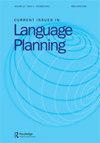When the linguistic market meets the tea business: language attitudes, ideologies and linguistic entrepreneurship in the Blang community in China
IF 1.8
1区 文学
Q2 EDUCATION & EDUCATIONAL RESEARCH
引用次数: 2
Abstract
ABSTRACT This paper examines the impact of the local tea industry on the language ecology of the geographically remote Blang community in China. The paper takes an ecology perspective in language planning where all languages in the locality are given equal attention. These languages in the context of this paper include Blang, Putonghua, and English as the leading global lingua franca of international trade. The study used a qualitative approach and reports findings from semi-structured interviews collected in Yunnan Province. The discursive approach allows for the analysis of participants’ attitudes and ideologies vis-à-vis the changing economic and linguistic ecology. The findings demonstrate that the local tea industry has increased the economic value of Putonghua and further marginalised Blang. Putonghua and English were ideated as capital in the domestic and global markets, while Blang was perceived as having no economic value. These findings point towards a weakening vitality of Blang and reflect the uneven power relations favouring Putonghua and English. While economic entrepreneurship was paired with linguistic entrepreneurship, this agentive behaviour was mainly directed towards learning the dominant languages by the Blang people, and it was related to the extent to which individuals themselves engaged with the tea business.当语言市场与茶业相遇:中国布朗族的语言态度、意识形态与语言创业
本文考察了当地茶业对中国地理位置偏远的布朗社区语言生态的影响。本文在语言规划中采用生态学的观点,对当地的所有语言给予同等的重视。在本文的背景下,这些语言包括布朗语、普通话和英语,它们是全球领先的国际贸易通用语。该研究采用了定性方法,并报告了在云南省收集的半结构化访谈的结果。话语方法允许分析参与者对不断变化的经济和语言生态的态度和意识形态。研究结果表明,当地茶业提高了普通话的经济价值,并进一步边缘化了布朗。普通话和英语被认为是国内外市场的资本,而布朗则被认为没有经济价值。这些发现表明布朗的活力正在减弱,并反映了有利于普通话和英语的不均衡的权力关系。虽然经济创业与语言创业相结合,但这种代理行为主要针对布朗人学习主流语言,这与个人自己参与茶叶业务的程度有关。
本文章由计算机程序翻译,如有差异,请以英文原文为准。
求助全文
约1分钟内获得全文
求助全文
来源期刊

Current Issues in Language Planning
Multiple-
CiteScore
4.80
自引率
16.70%
发文量
26
期刊介绍:
The journal Current Issues in Language Planning provides major summative and thematic review studies spanning and focusing the disparate language policy and language planning literature related to: 1) polities and language planning and 2) issues in language planning. The journal publishes four issues per year, two on each subject area. The polity issues describe language policy and planning in various countries/regions/areas around the world, while the issues numbers are thematically based. The Current Issues in Language Planning does not normally accept individual studies falling outside this polity and thematic approach. Polity studies and thematic issues" papers in this journal may be self-nominated or invited contributions from acknowledged experts in the field.
 求助内容:
求助内容: 应助结果提醒方式:
应助结果提醒方式:


